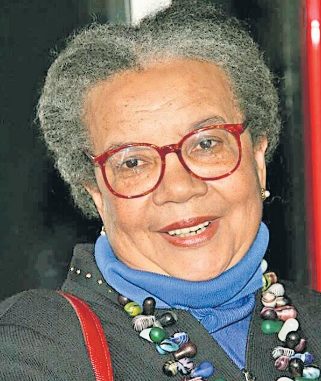By Marian Wright Edelman
Sherrilyn Ifill, the wonderful President and Director-Counsel of the NAACP Legal Defense and Educational Fund (LDF), just announced she will step down from LDF next spring.
As the head of the nation’s premier civil rights legal organization fighting for equal justice under the law, she has been an extraordinary voice in the struggle for racial justice and equality. Ifill is a nationally recognized expert on voting rights and judicial selection and a scholar, teacher, author, and pioneer in so many areas, and she embodies the values of tolerance, respect, and appreciation of all differences combined with an extraordinary intellect.
Ifill has said when she was a child, Congresswomen Shirley Chisholm and Barbara Jordan were her role models because she admired their moral power and the way they “commanded a room with just the force of their voices”: “Because of them, I knew I wanted to speak truth to power. And they let me know that it was possible for an ordinary Black woman to do it.” That is precisely what she has done at LDF.
As LDF’s seventh Director-Counsel, she carried on a long legacy that started when Thurgood Marshall founded LDF in 1940. When I graduated from law school I went to work at LDF in New York City, where Julius Chambers and I were the first two Earl Warren fellows—a program designed to train and support young lawyers seeking to practice civil rights law in the South—and then served as an LDF legal intern in Mississippi. I have cheered on her leadership of LDF during another critical time that has required fierce determination and vigilance against every new attempt to push our progress backwards.
Ifill grew up listening to social and political commentary in family conversations in her living room (the same family that produced the late pioneering journalist Gwen Ifill, her first cousin), and knew she wanted to be a civil rights lawyer when she was nine or 10 years old.
After graduating from law school, she served first as a fellow at the American Civil Liberties Union and then for five years as an assistant counsel in LDF’s New York office, where she litigated voting rights cases. She then spent twenty years as a tenured professor at the University of Maryland School of Law, continuing to litigate and consult on civil rights cases; establishing one of the first legal clinics in the nation focused on removing legal barriers for former prisoners preparing to reenter society; and publishing the searing book On the Courthouse Lawn: Confronting the Legacy of Lynching in the 21st Century. In 2013, she returned to lead LDF.
Under her leadership LDF intensified its litigation challenging voter suppression, racial discrimination in the criminal justice system, and housing discrimination, and took a leadership role resisting federal efforts to roll back civil rights gains in affirmative action, employment discrimination, school discipline policies and more. LDF is also at the forefront of civil rights organizations challenging unconstitutional policing practices in cities around the country. Ifill has been at the helm of LDF during a historical moment fraught with new 21st century threats and assaults on many fronts, and LDF’s work under her tenure has been essential.
In January 2020 I had the pleasure of introducing her when she received the Choral Arts Society of Washington’s Humanitarian Award at the annual choral tribute to Dr. Martin Luther King, Jr., a beloved tradition at the Kennedy Center in Washington, D.C.
That evening she agreed our nation was in “a perilous moment”: “It’s a moment in which the principles that we hold most dear and that we think of as being synonymous with the vision of this country are being challenged in every way. And it’s in some ways a discouraging time, a frightening time, an uncertain time.”
But she reminded us that Dr. King talked about “forcing the tension to the surface” and noted that this moment when so much is now at the surface is also a moment of opportunity: “What that means is that this is the beginning of transformation. Once it’s surfaced and you can see it and get your hands around it, then you can fight it. And so, rather than be discouraged, we should see this as the moment in which precisely what we knew lay beneath the surface, beneath the veneer of civility, has been released. I’m not saying it’s fun. I’m not saying it’s not distressing. But what I’m saying is that we can handle it, and we have before us the example of extraordinary individuals who showed us the way to do it, who showed us how to have the courage.”
She cited the examples of leaders who came before her at LDF “[and] built out this organization that literally transformed and re-navigated the trajectory of American democracy. Now, how did they do this? Did they do this because they had a giant endowment of money? No. . . . Did they have a blueprint? Was there some plan that they had inherited for how they would break the back of Jim Crow, which was their goal? Was there another country somewhere in the world where there was a thriving, multi-racial constitutional democracy? Were they, themselves, people of privilege? No. None of those things were true. There was no blueprint. They made it up. They pulled deep into themselves, and they read the founding instruments of this country, and they determined that they would hold this country to its words, and they created a blueprint.”
Ifill followed the blueprint left for her at LDF with skill, strength, and grace to push our nation closer to what it should be, and is now leaving a blueprint for her successor Janai Nelson and many others to follow. I am so grateful for her work at LDF and her work yet to come.
Marian Wright Edelman, founder and president emerita of the Children’s Defense Fund (CDF), has been an advocate for disadvantaged Americans for her entire professional life



